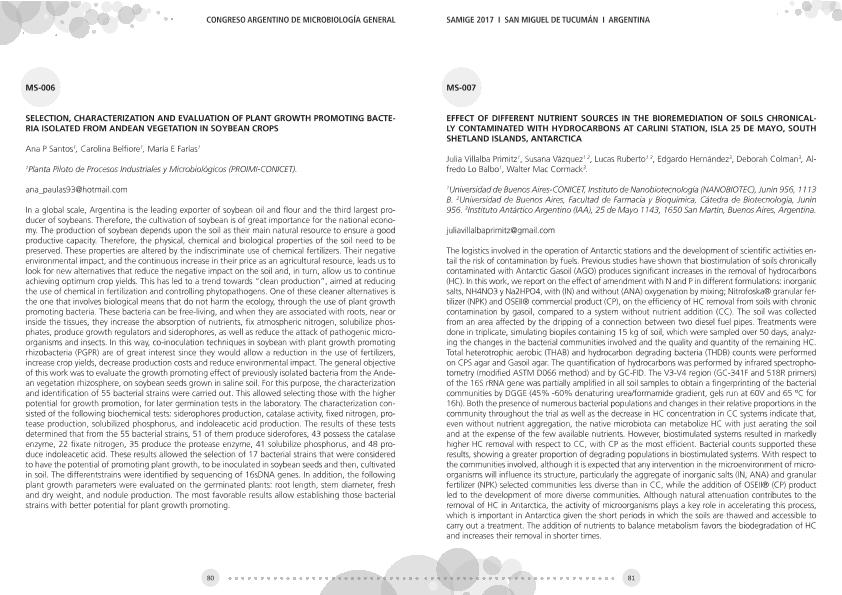Mostrar el registro sencillo del ítem
dc.contributor.author
Santos, Ana Paula

dc.contributor.author
Belfiore, Carolina

dc.contributor.author
Farias, Maria Eugenia

dc.date.available
2023-02-15T13:47:28Z
dc.date.issued
2017
dc.identifier.citation
Selection, characterization and evaluation of plant growth promoting bacteria isolated from andean vegetation in soybean crops; XII Congreso Argentino de Micorbiología General; San Miguel de Tucumán; Argentina; 2017; 1-1
dc.identifier.uri
http://hdl.handle.net/11336/188083
dc.description.abstract
In a global scale, Argentina is the leading exporter of soybean oil and flour and the third largestproducer of soybeans. Therefore, the cultivation of soybean is of great importance for the national economy.The production of soybean depends upon the soil as their main natural resource to ensure a good productive capacity. Therefore, the physical, chemical and biological properties of the soil need to bepreserved.These properties are altered by the indiscriminate use of chemical fertilizers. Their negative environmental impact, and the continuous increase in their price as an agricultural resource, leads usto look for new alternatives that reduce the negative impact on the soil and, in turn, allow us tocontinue achieving optimum crop yields.This has led to a trend towards "clean production", aimed at reducing the use of chemical infertilization and controlling phytopathogens. One of these cleaner alternatives is the one that involvesbiological means that do not harm the ecology, through the use of plant growth promoting bacteria.These bacteria can be free-living, and when they are associated with roots, near or inside the tissues,they increase the absorption of nutrients, fix atmospheric nitrogen, solubilize phosphates, produce growth regulators and siderophores, as well as reduce the attack of pathogenic microorganisms andinsects.In this way, co-inoculation techniques in soybean with plant growth promoting rhizobacteria (PGPR)are of great interest since they would allow a reduction in the use of fertilizers, increase crop yields,decrease production costs and reduce environmental impact.The general objective of this work was to evaluate the growth promoting effect of previously isolatedbacteria from the Andean vegetation rhizosphere, on soybean seeds grown in saline soil. For thispurpose, the characterization and identification of 55 bacterial strains were carried out. This allowedselecting those with the higher potential for growth promotion, for later germination tests in thelaboratory.The characterization consisted of the following biochemical tests: siderophores production, catalaseactivity, fixed nitrogen, protease production, solubilized phosphorus, and indoleacetic acid production.The results of these tests determined that from the 55 bacterial strains, 51 of them producesiderofores, 43 possess the catalase enzyme, 22 fixate nitrogen, 35 produce the protease enzyme, 41solubilize phosphorus, and 48 produce indoleacetic acid. These results allowed the selection of 17bacterial strains that were considered to have the potential of promoting plant growth, to be inoculatedin soybean seeds and then, cultivated in soil. The differentstrains were identified by sequencing of16sDNA genes.In addition, the following plant growth parameters were evaluated on the germinated plants: rootlength, stem diameter, fresh and dry weight, and nodule production. The most favorable results allowestablishing those bacterial strains with better potential for plant growth promoting.
dc.format
application/pdf
dc.language.iso
eng
dc.publisher
Asociación Argentina de Microbiología

dc.rights
info:eu-repo/semantics/openAccess
dc.rights.uri
https://creativecommons.org/licenses/by-nc-sa/2.5/ar/
dc.subject
SOYBEAN
dc.subject
SOIL
dc.subject
CLEAN PRODUCTION
dc.subject
PLANT GROWTH PROMOTING BACTERIA
dc.subject.classification
Biotecnología Medioambiental

dc.subject.classification
Biotecnología del Medio Ambiente

dc.subject.classification
INGENIERÍAS Y TECNOLOGÍAS

dc.title
Selection, characterization and evaluation of plant growth promoting bacteria isolated from andean vegetation in soybean crops
dc.type
info:eu-repo/semantics/publishedVersion
dc.type
info:eu-repo/semantics/conferenceObject
dc.type
info:ar-repo/semantics/documento de conferencia
dc.date.updated
2023-02-10T17:53:17Z
dc.journal.pagination
1-1
dc.journal.pais
Argentina

dc.journal.ciudad
San Miguel de Tucumán
dc.description.fil
Fil: Santos, Ana Paula. Consejo Nacional de Investigaciones Científicas y Técnicas. Centro Científico Tecnológico Conicet - Tucumán. Planta Piloto de Procesos Industriales Microbiológicos; Argentina
dc.description.fil
Fil: Belfiore, Carolina. Consejo Nacional de Investigaciones Científicas y Técnicas. Centro Científico Tecnológico Conicet - Tucumán. Planta Piloto de Procesos Industriales Microbiológicos; Argentina
dc.description.fil
Fil: Farias, Maria Eugenia. Consejo Nacional de Investigaciones Científicas y Técnicas. Centro Científico Tecnológico Conicet - Tucumán. Planta Piloto de Procesos Industriales Microbiológicos; Argentina
dc.relation.alternativeid
info:eu-repo/semantics/altIdentifier/url/https://samige.org.ar/wp-content/uploads/2022/10/Libro-SAMIGE-2017.pdf
dc.conicet.rol
Autor

dc.conicet.rol
Autor

dc.conicet.rol
Autor

dc.coverage
Internacional
dc.type.subtype
Congreso
dc.description.nombreEvento
XII Congreso Argentino de Micorbiología General
dc.date.evento
2017-08-02
dc.description.ciudadEvento
San Miguel de Tucumán
dc.description.paisEvento
Argentina

dc.type.publicacion
Book
dc.description.institucionOrganizadora
Asociación Argentina de Microbiología
dc.source.libro
XII Congreso Argentino de Micorbiología General
dc.date.eventoHasta
2017-08-04
dc.type
Congreso
Archivos asociados
